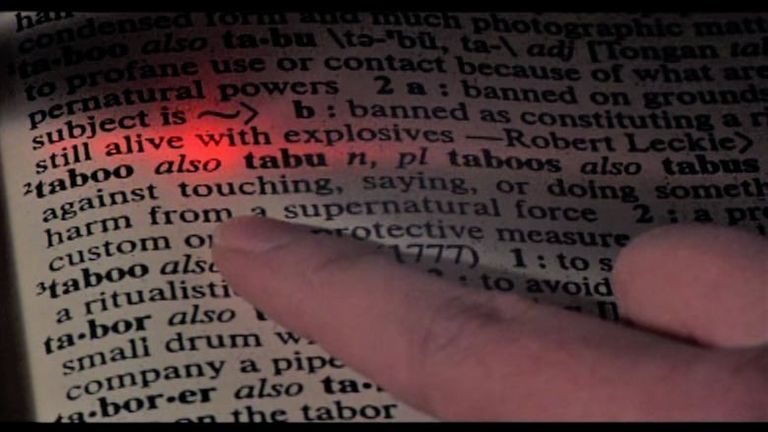Six teenagers engage in a game of Taboo, anonymously revealing their sins of the flesh. One year later, the sextet returns to the mansion where they first played the game, only to be confronted by a blackmailer who will extort the gravest of prices.
Analysis: Director Max Makowski defied every expectation that I had for a film called Taboo. I expected a breezy teen slasher, but found a sinister thriller. I anticipated gobs of violence, but found none. I predicted overt sexuality, and received my third strike. I hate being wrong, especially three times in a single sitting. The devastating blow to my ego aside, the element of surprise works both for and against Taboo. It's obvious from the very beginning that Makowski wanted to make an artsy sort of slasher film that flies in the face of everything we have come to expect, but I remain unconvinced that this was the best approach.
The first surprise is Taboo's all-star cast. I can't remember the last time I reviewed a film where all of the actors had head-shots posted on IMDB.com. January Jones (Full Frontal, Anger Management) is unexpectedly comfortable in the role of the frigid ice-princess Elizabeth. She is decidedly unlikable, which is no small task for one of Hollywood's sweetest creatures. Nick Stahl (In the Bedroom, Terminator 3) doesn't quite fill out the male lead Christian, but is adequate nonetheless. Eddie Kaye Thomas (American Pie, Freddy Got Fingered) is at ease with his preppy clothes and rich friends, but would have been better suited to play Stahl's part. Lori Heuring, Derek Hamilton and Amber Benson ("Buffy the Vampire Slayer") crawl in and out of the woodwork, amounting to little more than background noise. In the grand scheme of things, the cast meant very little to Taboo. They're merely brush strokes that paint the mood, no different from the music, the set or the lighting. I suppose it takes some thread of talent to deliver an unnoticable performance, as opposed to a poor performance.
I have a number of problems with the story, which I will discuss in an overly vague and ambiguous fashion to avoid the temptation of treading too far. First, there's the introduction. Six college "friends" play a game and reveal a dark desire that will ultimately seal their fate. Unfortunately, these "friends" don't even seem to like each other to begin with, causing a flag to be thrown before the ball is even snapped. The animosity builds mood, but doesn't stand to reason. Then, there's the lack of originality. Upon their reunion one year later they receive a stack of cards, which I half-expected to read "I know what you did last summer." Finally, there's the knotted story. The twist that eventually comes is easily anticipated, since the film would otherwise be forced to end at around 45 minutes. Taboo soon becomes ensnared in a needlessly complicated web of lies and deceit. While the tragic ending offers Taboo some redemption, it's too much of a Shakespeare rip-off to complete the atonement.
Taboo is most remarkable for it's atmosphere. No single element on its own could produce the film's eerie hue. The characters aren't any different from the furniture; however, it's their self-important attitudes, and not their sins, that make them unsympathetic. If it was intentional, then this vacuum -- void of any substantive human interaction -- is nothing short of genius. By creating a state of emotional detachment in the viewer, Makowski removes an important obstacle to his goal of complete darkness. The music is subtle, playing in the background and below the level of consciousness. The lighting is routinely dim. There are no indications that something grave is about to happen, rather there is a constant feeling that something just isn't right. This ominous tone persists throughout the film and raises the film above the sum of its singular elements.
We never watch a violent death or a sexual escapade, they are only alluded to. It might appear that Makowski is making a concerted effort not to cheapen his film, but I believe that more is at work. Watching one kill another ultimately establishes victim and villain. Sex is perhaps the most intimate physical experience that two people can possibly share. Beyond the fact that sex and gore are explicit acts found in virtually every horror film, they both work to establish a human connection, something that would work against Taboo's lifeless thread. Whether or not all of this was intentional, I cannot say. Makowski may simply have gotten lucky with all the cards falling where they did.

source
Final Comments: Taboo has value as an oddity, but not as a horror film. For all my raving, I didn't really enjoy it. With the lack of action and sympathetic characters, I often found myself bored. Taboo can stir conversation among intellectuals, but fails to entertain on a more fundamental level.

